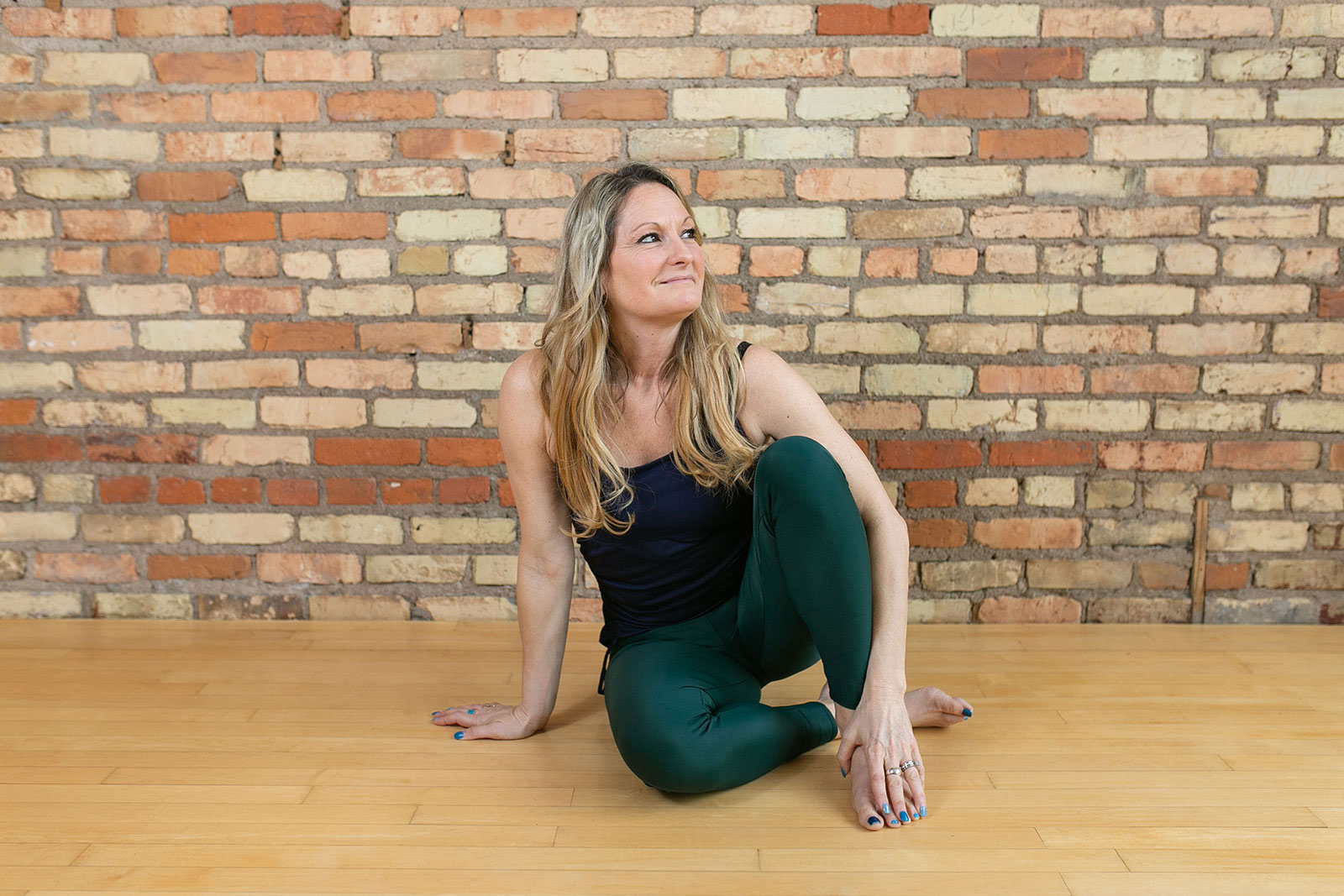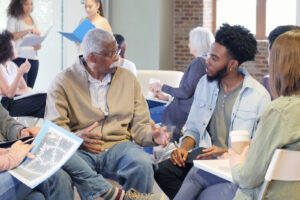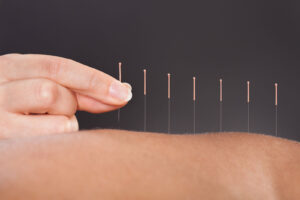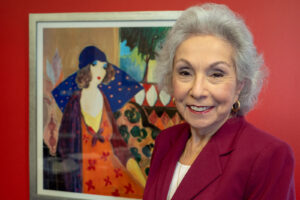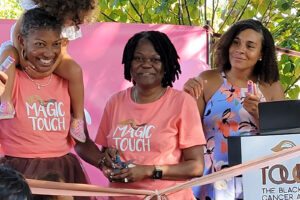For Hilaire Lockwood, founder of Hilltop Yoga, the cancer journey was one where she had to trust herself. A 15-year yogi at the time of diagnosis, Lockwood was meditating when she touched her neck and had a dark vision of illness. Diagnosed with metastatic resistant thyroid cancer, Lockwood was given a 1 percent chance of survival. It was this same practice of meditating that she credits with saving her life. “It is why I’m here. It’s why I’m calmer than I would be,” she says.
Lockwood has long known that she was intuitive, someone whose senses of inner knowing are heightened. Her “hippie” parents encouraged her to develop her gifts, never questioning or challenging things like her imaginary friends. “I think I’ve always really trusted that space. I never got to the point where I felt like that was weird or awkward,” says Lockwood.
Even for someone like Lockwood, trusting that inner voice came with challenges leading up to her cancer diagnosis and treatment. At first, she brushed off these early signs, including a visit to a psychic who told her that cancer was present in her chart and a letter from a friend whose story of cancer felt somehow familiar.
“I feel like, if I had really been paying attention, then I would have listened in 2000 to the signs that I was getting rather than listening in 2004 when it was further along than it would have been,” she says. In her moments of meditation, Lockwood explored whether she was trying to control the message by being too attached to what it might mean. Eventually, she couldn’t ignore what she was feeling and seeing. The heat she felt from the middle and left side of her neck became consistent enough where she took the step to investigate further.
After four local surgeons told her it was nothing, she found herself in a radiologist’s office without a referral or an appointment, crying in the waiting room and asking to be seen. The receptionist was preparing to call security when the radiologist appeared, calming her down and agreeing to take a look. He performed an ultrasound which was immediately followed by a triple neck biopsy. From what he saw, he said it could be either a cold or cancer but that he thought it was cancer. Armed with this information, Lockwood was able to get the official diagnosis from her doctor.
“I think what’s most important is that we have to remember that it’s our body and, no matter what they’re telling us to do, it’s got to feel right for us,” says Lockwood.
When it came to picking her medical team, Lockwood realized that she needed to listen to her inner knowing again and advocate for the right treatment and doctors. “I think we all kind of do the same thing at first,” she says. “We do what they tell us to do and we go to the person that’s in town and I think that’s a bad plan. I really listened to my heart and to my soul. The people you have on your team, that’s everything—everything. You have to trust them. They have to actually listen to you.”
This is important, Lockwood points out, because it became harder to know the voice of her intuition while undergoing treatments. She explains, “I got to that place where, you know, I was well and I thought I was sick or I was sick and I thought I was well. Just because we’re so deeply attached to the outcome that it’s very difficult to see clearly.”
We have to recognize that together — that my body, my mind, my soul — they have to work together to heal.
During the course of her cancer, Lockwood received radiation, her thyroid was abated and she had four neck dissections spaced about 14 weeks apart each, with a fifth dissection three years later. Lockwood also explored treatments like Reiki, massages and acupuncture.
It was surrounding herself with the right people that led to a major discovery. After undergoing radiation, she was introduced to a doctor through a friend of a friend who told her to get tested for resistance before getting more radiation. Lockwood said she had to “fight like hell” to get the test, but it came back showing that her cancer was resistant and metastatic which put her in the 1 percent of survival with thyroid cancer. Without this discovery, it is likely that Lockwood would have received radiation an additional three or four times.
The most miraculous moment came at one of the toughest. Between her second and third surgeries, a CAT scan showed that the cancer had spread into the soft tissue of her chest, which would have been dire in her situation. Afterwards, Lockwood describes sitting in the middle of a healing circle, surrounded by rose petals and her most dedicated students, as they sent energy to her. When she received another scan, the cancer in her chest was gone.
For Lockwood, who believes her soul chose cancer to teach her in this lifetime, having her thyroid abated became a lesson in the pace her life had taken. “I had to really take a step back and make sure that I was paying attention to all of the pieces of my life. And that this was a true universal smack across the face to say, stop, and see what you actually have and pay attention to the quality of every moment,” she says. This is why lesson plans aren’t allowed in her yoga studio. Teachers are asked to walk in, feel the room and go from there.
It was through regular practice of the eight limbs of yoga that Lockwood was able to keep pushing forward. The eight limbs are well-rounded guidelines that extend beyond the most commonly known asana (the physical aspect of yoga) and dhyana (meditation) to include ethics, self-discipline, breath control, detachment and concentration. She was teaching yoga within a week of her surgeries because she believes it was helping her heal. As a teacher, she got just as much out of working with students to deepen their practice as she was giving. “This was part of me being able to get up and continue to put one foot in front of the other,” she says.
In these places of trauma, it can be easy to blame the body. “If, through my process, I were to pick apart my body and say ‘My body is bad. My body is what is sick. My body is separate from me,’ I’d probably be done,” Lockwood says.“We have to recognize that together — that my body, my mind, my soul — they have to work together to heal.”
For those looking to deepen this body/mind/soul connection, Lockwood recommends starting with your breath and observing throughout the day whether you’re actually breathing. In times of high stress, it can be surprising to witness that you have stopped breathing or are holding your breath. If you catch this, she recommends taking a deep breath, because this influx of oxygen and the act of releasing will help the brain reset.
Clear of cancer, Lockwood says meditation and activating the trust in her inner knowing is still very important. “Meditation is everything. It just is. It changes everything. I do my best to sit an hour every day. And if I don’t get an hour, I make sure that it’s at least 30 minutes. In an hour, everything shifts for me,” she says. Set a timer and try it yourself.

